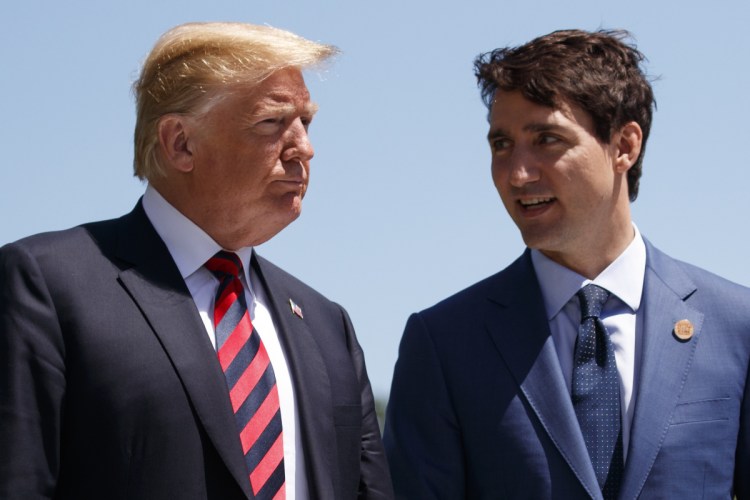Until now, pretty much all of Canada had Justin Trudeau’s back in his NAFTA fight with President Trump – but cracks are emerging as some pivot to blame him if the pact falls apart.
The U.S. is using a deal it announced with Mexico on Monday to pressure Canada into signing on. That’s exposing rifts within the Canadian Conservative Party, Trudeau’s main opposition, which had mostly refrained from criticizing the prime minister on this issue. Prominent former Conservative lawmakers stuck to supporting the government in talks, but Conservative Leader Andrew Scheer blamed Trudeau.
The problem for the prime minister, who was elected in 2015 in spite of Conservative attacks that he was a lightweight who was “just not ready” to govern, is that any indication he allowed NAFTA to collapse could sour public opinion, as his embarrassing trip to India did earlier this year. So too could horse-trading if, for instance, he makes concessions on a dairy regime that’s more popular in some parts of the country than others. Public opinion has largely backed Trudeau until now. Canada’s next election is scheduled for late 2019.
“Canadians generally supported the approach when it looked like Canada and the United States were the ones working things out,” pollster Nik Nanos of Nanos Research said. “The narrative now for some Canadians is ‘have we become a passenger in the NAFTA negotiation process’ – because that’s clearly the signal Donald Trump sent.”
Scheer launched a political attack – if only by Canadian standards – this week. “Once again Justin Trudeau has failed Canadian workers,” Scheer tweeted amid reports of a U.S.-Mexico deal. “With the U.S. and Mexico coming to a trade agreement without Canada, Canadians are now on the outside with 1000s of jobs on the line.”
While hardly fire and fury, it raised eyebrows as a break in the political solidarity to-date. Other prominent Conservatives have avoided doing so. James Moore, a former industry minister and Rona Ambrose, former Conservative leader – who both served on a multi-partisan government NAFTA advisory council – each said this week that now was the window to haggle to reach a deal.
“We clearly have some momentum. We have a window here for a modernized NAFTA that will have some broad support from business and the general public,” Moore, now a senior adviser at Dentons, told BNN Bloomberg television Monday. “The alternative is economic chaos.”
John Baird, foreign minister under Stephen Harper, said there was no reason for Canada to be at the table for the recent U.S.-Mexico talks focused on auto rules. “Trump is now going to play hardball with Canada. However, our competent and highly experienced team of trade negotiators knew this all along. Trade negotiations are always toughest just before a deal is reached,” he tweeted.
Politically, what’s been apparent in Canada is a “really united front,” said Shachi Kurl, executive director of the Angus Reid Institute, a polling firm. “Much of this will hinge on what people see in front of them,” such as changes to the dairy system, known as supply management. “I suspect we’re going to find deep divisions in the country on this issue.”
Maxime Bernier, an outspoken Conservative lawmaker, quit the party this month partly to protest its support for supply management. That may force Scheer, who only barely beat Bernier for the party leadership, to soften his support for the dairy regime, she said.
Trump’s press conference Monday drew sharp rebukes from some observers in Canada. “I thought it was a disgraceful display of bad faith on the part of the Trump administration and the president in particular,” trade lawyer Lawrence Herman said in a telephone interview. The relationship has descended to an all-time low.” Canada can’t agree to accept a deal that’s forced on it as a take-it-or-leave-it offer, he said.
The political fallout will hinge, of course, on the outcome.
“This file changes day by day and tweet by tweet. Today, the narrative is the Liberals have to watch out that it doesn’t look like they’re going to get steamrolled by the Americans on NAFTA,” Nanos said. But a deal “would be a significant accomplishment and political win.”
Copy the Story LinkSend questions/comments to the editors.



Success. Please wait for the page to reload. If the page does not reload within 5 seconds, please refresh the page.
Enter your email and password to access comments.
Hi, to comment on stories you must . This profile is in addition to your subscription and website login.
Already have a commenting profile? .
Invalid username/password.
Please check your email to confirm and complete your registration.
Only subscribers are eligible to post comments. Please subscribe or login first for digital access. Here’s why.
Use the form below to reset your password. When you've submitted your account email, we will send an email with a reset code.